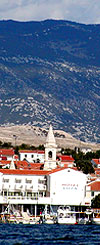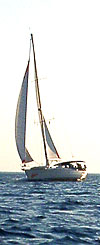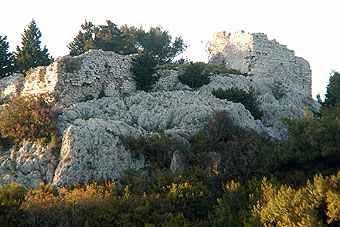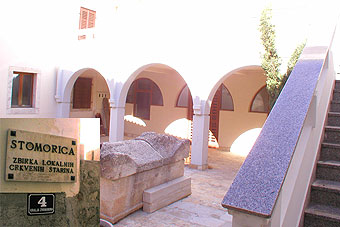|                     



|
History
of the island of Pag
Pag Island as a whole and its history goes back in the
course of 11 centuries. Traces of the Early Neolithic,
traces of the Mediterranean culture people who "came
from the sea", the Roman remains of a large scale,
early Slavic remains, the Middle Ages the island, especially
Cissa and old Pag are just some of the characteristics
of this beautiful and historically rich islands.
In
the northwestern part of the bay of islands, long 15 km,
are located the ruins of a Roman settlement,

probably a fortified Roman city that is mentioned under
the name Cissa (today Caska). Called him yet, and Kiss,
Gissa, Chissa, Insula Paganorum and Pagus ante Gissa appellata.
Visible are also traces of all the people who lived here.
Some local names as Lun, Maun, Skrda the Illyrian origin.
Old names are Latin and custom: Barbati, Latin barbatus
= overgrown, wooded, Pag, Latin Pagus = Village; Novalja
of Navalia = shipyard, port or novalis = Krčevina, land
fallow. But the largest number of village names and, in
general, geographical terms, of Slavic origin, and the
names themselves and prove that the Croats settled the
island of Pag is very early. However, keep the other names.
Pag is the domination of Greece on the Adriatic coast
belonged to the group of islands called Mentorides. Supervisors
were the Illyrian tribe of the neighboring Velebit. In
the early Middle Ages, we have it called Insula Novalia
(Novalja island), Loni insula (island Lun).
Over time, as Cissa becomes true center of the island,
and the Romans and during the Middle Ages, until the thirteenth
century, the island is a long name appoints Cissa (Rain).
From the old Illyrian, Roman and then medieval center
Cissa remained until today mainly ruins under the ground.
Legend and some archaeological finds certain that the
city was one big, that was dynamited several times, and
that is partially sunk in the earthquake 361st year.
Novalja Novalja today and gradually sprang up as "external
port" Cissa, because it is very difficult to affordable
and it is supposed to bond with the open sea.
The population of Mediterranean culture, the mid-2nd millennium
in the Neolithic blend with new immigrants, Illyrian Liburna.
History records them as cattle breeders, farmers, sailors
and famous pirates. At several places on the island, found
their remains from the early Iron Age.
Liburnians on the islands share the fate of its neighbors
in the Land 1st century AD and after long-term struggle
with the Romans, they obey the Roman economy.
The
town already in the 5th century we find traces of the
early monuments, three basilica, a stone sarcophagus,
mensa, etc. The remains of the urban basilica, and cryptic
fragments found in Novalja. Set the thesis that it is
already in the 4th century there diocese.
In the area of today Novalja, which in history was shaped
castrum - fortifications. Detected basilica with partially
preserved floor mosaics. Far from it dug the potentate
that dates from the end of 4th century. Another similar
church Basilical type shape with a semicircular apse reveals
to the so-called. Kindergarten, second in the open air,
and several smaller left barely recognizable traces along
the town.
Stone remains of furniture and decorations listed churches
are located in several places on the island, and also
in the museum in Novalja and a small collection of stone
monuments under "Stomorica".

Finding
between the two communities that were at that time strengthens
its position - Pag is late in its independence and became
a victim of a neighboring commune island of Rab and even
stronger neighbors, Zadar, which is aiming to become a
republic. Pag, forced to hold between Rab and Zadar, and
because of frequent disagreements with the rule, used
in writing privileges, promises, and the accession of
Venice as a better partner against Zadar.
With the Crusaders (1202 - 1244) Venice occupies and destroys
Zadar. After the withdrawal of the Crusaders, Zadar attack
Pag , plunder and destroy so much already infested Cissa
that is never recovered.
Pag
is through history suffered many tribulations, from Napoleon's
siege (1806.godine), the first world war, Italian occupation,
famine and poverty, the second world war ...
Postwar
development of the island of Pag was difficult due to
underdeveloped capacity in the past. First of all, it
was necessary to build destroyed houses, roads, etc. Now
they are beginning to show shortcomings of infrastructure:
water, roads, electrification.
Lack of water is particularly difficult to maintain in
Novalja, which is their greatest efforts and hope invested
in tourism. Novalja remembers his small waterworks from
1912. year, when the Roman water supply through water
came with a windmill.
The entire island of Pag is focused on the submarine,
which stops water supply from sources Bacvice on Velebit.
Year 1982. water came up to Novalja and thus ended the
greatest concern.
To
this date, all villages has increased immeasurably and
ensure yourself a good tourist season.
Beauty of the island of Pag, reportedly even 1925. discovered
the tourists from the Czech Republic and Poland and has
since then recorded the 6580 overnight stay, and in the
thirties Pag and Novalja declared the tourist areas of
Sušačkog Tourist Association.
|
| return
to previous page  |
|
| |
NOVALJA
Holiday in Novalja and get to know its streets, beaches, history
and culture ... |
|
|
| |
PAG
Medieval city 15th st
old walls, saltern, beautiful panoramas ... |
|
|
| |
STARA NOVALJA
Strange little place that offers a 5 km long with beautiful
beaches ... |
|
|
| |
GAJAC
Relatively new settlement, a lot of apartments, parking lots,
3 kilometers from Novalja |
|
|
| |
CASKA
A beautiful bay with a very nice beach in front of that stir
sunken Roman city |
|
|
| |
VIDALIĆI
A small town isolated from noise and crowd, ideal for a holiday
in full sense |
|
|
| |
ZUBOVIĆI
As in Vidalići calm and separate. The cliff offers a wonderful
panorama |
|
|
| |
METAJNA
Small bay, close to very beautiful beaches Rueica, suitable
for rock climbing sports |
|
|
| |
SVETI DUH
Very nice camp in unspoiled nature of the island of Pag |
|
|
| |
ŠIMUNI
Camping with small bungalows, ACI marina is protected from
all winds |
|
|
| |
POTOČNICA
A small cove with beautiful sandy beach - Kukurina |
|
|
| |
JAKIŠNICA
Beautiful bay, protected on the boats, scattered houses -
perfect for vacation |

|
|
| |
KUSTIĆI
Great little place with a large offer of private accommodation.
Lots of small beach |

|
|
| |
MANDRE
View of the islands and open sea, small beaches, plenty of
private accommodation |

|
|
| |
POVLJANA
Extends over two bays, facing the open sea, many beaches ... |

|
|
| |
VLAŠIĆI
Surrounded by many vineyards along the sea is very beautiful
stretch of sandy beach ... |
 |

